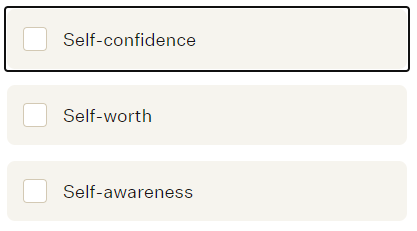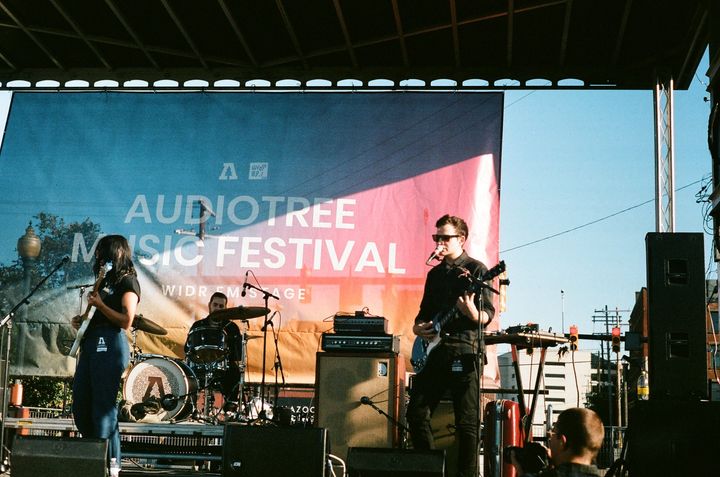On Noom, MyFitnessPal, and A Culture of Disordered Eating
An essay on diet culture and the way health and fitness programs both influenced and echo my eating disorder.

Since I was a child I've fallen into recording my food intake. When I was a kid I had dozens of different notebooks and binders dedicated to tracking what I was eating and when and if I was exercising and, if so, what was I doing and for how long. My mother went to weight watchers and had exercise tapes. I played sports where throwing up from conditioning was seen as a normal risk so when I started vomiting during practice because I wasn't eating enough nobody thought much of it. I had pro-ana, thinspo blogs when I was in high school then, after I went into treatment for an eating disorder, I "developed an interest in high fashion" as a roundabout way to do the same thing.
I've been comfortable discussing my history with eating disorders for a long time. It's something I have dealt with for as long as I have any memories. I am and have always been hyperconscious of my weight and the way I use food intake to feel some sense of control over my life and emotions. You're not supposed to say this, but dealing with my tendency toward disordered eating is as much a part of my life as any other proclivity or interest I have. It overwhelms me. It has overwhelmed me over the last month especially.
For me, downloading MyFitnessPal is only one step above finding myself actively purging. The hold that MyFitnessPal had over pro-eating disorder culture is unparalleled. MyFitnessPal is a food and exercise tracking app owned by Nike. The way it's set up is heavily bent toward weight loss. You're required to put in your height and weight and it tells you how much you should eat to lose the amount of weight you tell it you're hoping to lose. It's an encyclopedia of calories. With the food search function you can find out how many calories are in anything you could hope to put in your mouth. As a teenager, this was everything to me. I used this app shrouded in a veneer of health consciousness to justify all kinds of self harm.
Maybe there are people who can use an app like that and not abuse it to hurt themselves, but I know I'm not the only one who can't. I have no idea how someone could open an app that says, "Okay, you weigh X lbs and are Y inches tall, eat this many calories to get to your goal weight" and not immediately feel shame. Making weight loss and fitness into this extremely linear, obsessive activity through tracking changes your attitude toward food. If you're not careful, eating becomes a cycle of success or failure depending on if you're losing the weight or not.
Noom's entire marketing line is that losing weight is about changing your psychology toward food. To me, that's a red flag regardless of explanation. I saw a commercial on TV that featured a man finishing his plates then finding out via Noom that he was "conditioned" to finish his plates since childhood. It implies he's overeating because when he was a child he was forced to finish his plates and that's why he can't lose weight. It's this whole program that prides itself on this idea that it isn't a diet, it's a healthy lifestyle change– you know, as long as you want to 1. lose weight, 2. get fit, or 3. both. (Those are the only options provided when setting up a profile.)
It's not a diet, but you should put in if you have a special event to motivate yourself to look better! It's not a diet, but since I'm in my 20s I should tell them whether I eat sandwiches/wraps or soup/salad for lunch. Those are my options. They need to know if I eat less than 3 meals a day, 3 meals a day and snacks, or a mix of both.
But hey, at least they ask if you have "an active eating disorder diagnosis" and won't let you keep going if you say yes! Whatever an "active" diagnosis means! Of course, you say no and keep going. You put in your current weight and your goal weight.
Now, up to this point it's felt normal. It's the same sort of questions as what My Fitness Pal and other dieting apps and programs have given. Then you get past your goal weight and the red flags really go off. You come to a screen that asks you, "What feelings are you hoping to achieve during your journey with Noom? (Select all that apply)"
And a list of positive words. Peace. Happiness. Revitalized. Gratitude. Empowerment.
Then another question: "I'm hoping that Noom will help me increase my… (Select all that apply)"
And another list:
Self-confidence. Self-worth. Self-awareness. Self-acceptance. Self-care.
Now, being more active and eating healthier certainly can have an impact on your mood, but this is a weight loss program and I can tell you right now that losing 10 pounds alone will not make you feel peace or gratitude or empowered. To promise that is misleading and it's that kind of mentality that breeds eating disorders. 10 years of "well once I hit my goal weight I'll be happy" or "once I hit my goal weight I'll be able to eat that" echoes in my head, then it's echoed on the next screen. Another multiple choice question with an option to say that once you're at a "happy weight" you'd be able to enjoy all foods guilt free.
I go through the rest of the questions. Coincidentally, they tell me I'll hit the "goal weight" I put in on my birthday. Happy birthday to me.
It promises there are no good or bad foods, just ones that are more or less calorically dense. It promises it's not a restrictive diet. It also has something to do with Cognitive Behavioral Therapy, I guess.
As I answer more questions, that date drops. July, then June, then April. How confident am I that I can lose 20 pounds by April 11th? Not that confident!
Now, I won't go beyond this. I don't want to give them money and I don't care to actually see how little they want me to eat everyday, but everything about this sends red flags up for me. There is no shame in wanting to lose some weight, but a program built on the foundation that losing weight will fix something deep inside like self-worth or get you to achieve real happiness or gratitude is destined to harm just as much as any yo-yo diet they rail against. To change your psychology toward food with that in mind is not going to create a healthy relationship with food that is sustainable.
They asked me what food is healthier: grapes or raisins. Absurd question, but the answer is about caloric density, not health. Grapes are mostly water and less calorically dense, so that's more healthy. Congrats, I got it right! Off the bat, it's absurd to market this as a anything but a diet. This is counting calories and putting green, yellow, or red on foods based solely on caloric density. No foods are bad, but, like, these ones are in the red section of the pie chart and are less healthy so :/ but like don't even worry you can still eat pizza!!
It's appalling the way diets are marketed and this is more insidious than most. It's not far from Weight Watchers and their food categorizations. This isn't entirely new, but it's shrouded in the words of millennial marketing.
On TikTok I see a lot of videos from women my age to about ten years older than me lamenting the sorts of dieting their moms pushed onto them. The 100 calorie snacks and idealizing weighing 120 pounds and going to Weight Watchers and constantly pushing whatever diet they've been sold. Moms trying to lose weight, but destroying their daughters' relationships with food and their bodies in the process. Watching your mom never be happy with herself then projecting her ideals onto you is damaging.
At the end of the day, healing your relationship with yourself can never come if you're relying on looking or weighing a certain way. Nothing weight loss focused has that power and programs like Noom that want to sell you that fantasy should be criticized out of business. Losing weight will not give you that control, believe me, no matter how much you want it to.
Miranda Reinert is a music adjacent writer, zine maker, and law school drop out based in Philadelphia. Follow me on Twitter to learn more about my eating disorder against your will: @mirandareinert. I also have a paid tier of this newsletter for $5 a month or $45 a year! If you do that I'll give you at least one free zine if you respond to this email with a mailing address! Wow! Might want to get in on that! You may also just send me small bits of money at @miranda-reinert on venmo if you want. But as always, thanks for reading!



Comments ()